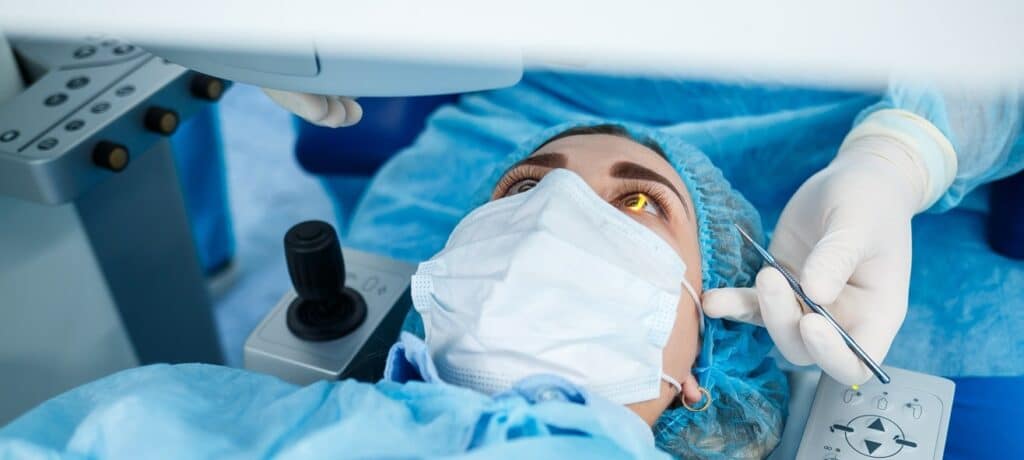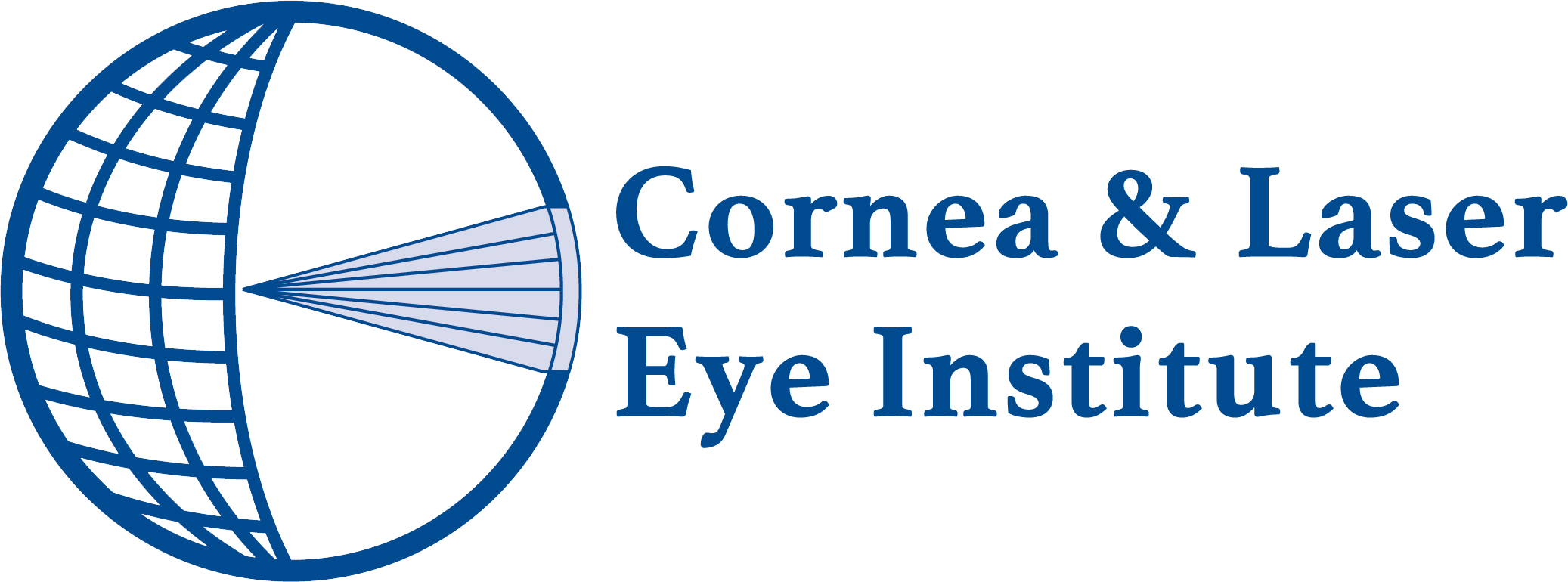
LASIK eye surgery can improve your vision and reduce dependence on glasses or contact lenses. It’s a quick and relatively painless procedure that reshapes the cornea to correct vision problems such as nearsightedness, farsightedness, and astigmatism. After the surgery, your eyes need time to heal and adjust to their new shape. This healing process is crucial for achieving the best possible visual outcomes.
While every individual’s healing journey is unique, most patients experience significant improvements in their vision within the first 24 to 48 hours after the procedure. In fact, most of our patients can return to work the very next day after surgery. However, it is important to note that complete LASIK eye surgery recovery and visual stabilization can take several weeks or even months. We’ll cover what to expect during recovery and how to speed up your healing journey.
Factors That Affect LASIK Eye Surgery Recovery Time
Several factors can influence the duration of your LASIK eye surgery recovery. The complexity of your vision prescription, the thickness of your cornea, and the health of your eyes can all impact healing time after LASIK. Additionally, your age and overall health play a role in how quickly your eyes recover.
In preparation for your LASIK surgery, it is essential to disclose any pre-existing medical conditions or medications you are taking to your eye surgeon. Our team of qualified surgeons will evaluate these factors during your initial consultation and provide you with a realistic expectation of your recovery period.
LASIK Surgery Healing Timeline
To give you a better idea of what to expect during your LASIK recovery, here is a general timeline of the healing process:
Day of Surgery
Immediately after the procedure, your vision may be blurry or hazy. You will experience discomfort, tearing, or a foreign body sensation in your eyes for the first couple of hours. This is a critical time for the LASIK flap healing. You will be instructed to return home after surgery and keep your eyes closed for 2-3 hours during this crucial healing time. For most patients, when you open your eyes after 2-3 hours the discomfort, tearing, and foreign body sensation is considerably less, and the vision is beginning to improve. The low energy used by the Z8 femtosecond laser, used for LASIK at the Cornea and Laser Eye Institute, usually accelerates this healing process. It is essential to rest and avoid any strenuous activities on the day of surgery.
First Few Days
During the first few days, your eyes will gradually start to heal. You may notice improvements in your vision, but it is common to experience fluctuations in clarity. It is crucial to follow your surgeon’s post-operative instructions and use any prescribed eye drops after LASIK to promote healing.
First Week
By the end of the first week, most patients experience significant visual improvements. However, it is essential to continue using any prescribed eye drops and avoid rubbing your eyes. Your surgeon may advise you to wear protective eyewear, especially at night, to prevent accidental eye trauma.
First Month
In the first month after LASIK surgery, your eyes will continue to heal, and your vision will stabilize further. It is essential to attend all follow-up appointments with your surgeon to monitor your progress and address any concerns.
Long-Term Healing
While most patients experience excellent visual outcomes within the first month, the full healing process can take up to six months or longer. It is important to be patient and follow your surgeon’s instructions during this time to optimize your healing journey. In some cases of over or under correction, a LASIK enhancement or “touch up” may be needed 3 to 6 months after your initial surgery to achieve the optimal visual outcome.
Post-Operative Care for Optimal Healing
Proper post-operative care is crucial for optimizing your LASIK eye surgery recovery. Your surgeon will provide detailed instructions tailored to your specific needs, but here are five general guidelines to follow:
1. Attend Follow-Up Appointments
Regular follow-up appointments are essential for monitoring your progress and addressing any concerns. Make sure to attend all scheduled appointments and communicate any changes or issues you may be experiencing.
2. Take Medications as Prescribed
If your surgeon prescribes any medications, such as eye drops or oral medications, make sure to take them as instructed. These medications play a vital role in promoting healing and preventing infection.
3. Avoid Makeup and Skincare Products
During the recovery period, it is best to avoid using makeup and skincare products around the eyes. These products can introduce bacteria and irritants, hindering the healing process.
4. Protect Your Eyes During Sleep
To protect your eyes while sleeping you should wearprotective eyewear provided by your surgeon. This prevents accidental rubbing or pressure on the eyes during the night.
5. Follow Activity Restrictions
Your surgeon will provide guidelines on activities to avoid during the LASIK recovery period. These may include swimming, contact sports, and heavy lifting. It is important to follow these restrictions to prevent any complications.
Common Concerns During LASIK Recovery and How to Address Them
During the LASIK eye surgery recovery period, you may experience some common concerns. Here are a few of them and how to address them:
Dry Eyes
Dryness is a common temporary side effect after LASIK surgery known as Surgical Temporary Ocular Discomfort Syndrome (STODS). To alleviate dry eyes, your surgeon may recommend artificial tears or prescribe medicated eye drops. It is important to use these drops as instructed to keep your eyes lubricated.
Glare or Halos
Some patients may experience glare, halos, or sensitivity to light, especially at night. These symptoms usually resolve on their own as your eyes heal. However, if they persist or worsen, it is important to consult your surgeon.
Fluctuating Vision
It is normal to experience fluctuations in your vision during the recovery period. Your vision may be clear one day and slightly blurry the next. This is part of the healing process, and your vision will stabilize over time.
Sensitivity to Touch
After LASIK surgery, your eyes may be sensitive to touch. Avoid rubbing or touching your eyes to prevent any complications. If you experience any discomfort, consult your surgeon for guidance.
Follow-Up Appointments and Monitoring Progress
To ensure a successful healing journey after LASIK eye surgery, regular follow-up appointments are crucial. These appointments allow your surgeon to monitor your progress, address any concerns, and make any necessary adjustments. It is important to attend all scheduled appointments and communicate any changes or issues you may be experiencing.
During these follow-up visits, your surgeon will evaluate your visual acuity, check your eye health, and determine if any additional treatments or adjustments are needed. By closely following your surgeon’s advice and attending all follow-up appointments, you can maximize your chances of a successful outcome.
Conclusion: Achieving a Smooth and Efficient Healing Journey After LASIK Eye Surgery
LASIK eye surgery can be a life-changing procedure, providing clear vision and reducing dependence on glasses or contact lenses. For a smooth and efficient healing journey, it is important to understand the recovery process and follow your surgeon’s instructions.
If you are considering LASIK eye surgery, consult with our qualified eye surgeon to determine if you are a candidate for the procedure. Contact us today to schedule a consultation at the Cornea and Laser Eye Institute and take the first step towards achieving clear and crisp vision without the need for corrective eyewear.




